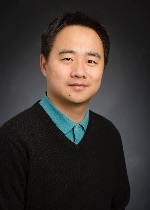|
|
| 2020 Overton Prize Winner: Jian Peng, PhD |
2020 ISCB Overton Prize: Jian Peng, PhD
Jian Peng, PhD, Assistant Professor, Department of Computer Science, College of Medicine (by courtesy), Institute of Genomic Biology (affiliate)
Cancer Center at Illinois (affiliate), National Center of Supercomputing and Applications (affiliate), University of Illinois at Urbana-Champaign
A Lifelong Love of the Sequence- Structure- Function Relationship
Jian Peng grew up in Yichang, Hubei Province, China to parents who were both university professors. His earliest memories include taking pleasure in his t time spent reading from his parents’ home l library, even when he could not fully comprehend the content of some the books. He recalled, “My parents were college professors, who always gave me the freedom to choose what I Iiked to do.” Peng was 10 years old when his parents gave him his first personal computer. and he was quickly drawn to computer programming. He spent many hours teaching himself to program and read programming books on C/ C++, Windows, and data structures. In high school, Peng became interested in chemistry, but he returned to his early interest in computer programming while pursuing his bachelor’ s and master’ s degrees in computer science at Wuhan University. As an undergraduate, Peng became deeply interested in mathematical logic and i ts applications to programming languages and wanted to pursue this topic in graduate school. He said, “ I didn’t find many places to study this topic. I was fortunate to meet with Professor Jinbo Xu, who was giving a bioinformatics talk at Tsinghua University and kindly showed me several fascinating papers, including his seminal work on the protein side chain packing problem. He suggested that I spend time reading textbooks on machine learning (ML), as he believed that ML would become a very useful tool in computational biology when more data become available.”
Peng went on to complete his PhD in 2013 at the Toyota Technological Institute at Chicago under Xu, where his research focused on protein structure prediction and modeling using ML methods. These methods, which are known as Raptor X and are still widely used today, have excelled at alignments of hard targets. Peng then joined Bonnie Berger’ s lab as a postdoc and expanded his research scope to include systems biology and functional genomics.
He recalled, “We have had a great time working on a variety of problems, including structural bioinformatics, compressive genomics, systems biology, and disease genomics. I also really appreciated my time in the lab of (the late) Susan Lindquist, where I learned a lot from experimental and wet lab biologists and found ways to help address important problems in neurodegenerative diseases using my computational skills.” He is deeply appreciative of his mentorship under Xu, Berger, and Lindquist not just for the areas of research he worked on with them but also for the lessons he learned in conducting experiments correctly and with rigor.
In 2015 , Peng was appointed as an assistant professor in the Department of Computer Science, and affiliated with the College of Medicine, at the University of Illinois at Urbana-Champaign. Peng's perspective in identifying new research topics has evolved with his maturation as an academic. As a student, he was more drawn to problems that he thought were highly interesting, or he was swayed by the “coolness” of a method. Now Peng appreciates that his research interests must also address important scientific problems, and he feels i t is critical to convey this concept to his trainees as they apply their knowledge in computation and biology to solve problems that deeply interest them.
Through his research experiences, Peng has learned that scientists are often surprised by unexpected findings. He said, “ What I’ve learned in these years from successes and failures is how capable (and incapable) computational methods can be. Like many artificial intelligence/ ML researchers, I was initially focused on developing powerful ML models for problems with large datasets, which hopefully can provide us new biological insights. However, in many important problems, such as those related to protein function and design, disease mutations studies, and functional genomics, the effective sample sizes are much smaller than what we expect for ML.” Peng's research has always been driven by understanding the sequence- structure- function relationship. Currently, Peng’s research has shifted directions towards using biological insights for developing advanced machine learning models. Like Bayesian methods, he uses known biological insights to serve as the “structural” prior to constrain ML models and generate new hypotheses in line with existing knowledge. Two recent notable projects in this line are the Deep Contact algorithm for protein contact map prediction and the Mashup algorithm (with Berger and Cho) for heterogeneous biological network data integration.
He is interested in understanding the functional and structural consequences of protein mutations. Peng appreciates the importance of this area in terms of designing proteins with better and more biologically relevant functions, but also improving the annotation of missense mutations in human genomes for gaining insights in molecular mechanisms of human diseases.
Peng is greatly humbled and honored to receive the 2020 ISCB Overton Prize as it is a recognition from his peers within the ISCB community, and he shares his gratitude with the mentors, students and collaborators that have brought his work to fruition.
![]()
ISCB will present the Accomplishments by a Senior Scientist Award, Overton Prize, Innovator Award and Outstanding Contributions to ISCB Award, at ISMB 2020 (www.iscb.org/ismb2020), which will take place in Montreal, Quebec, Canada, July 12-16, 2020 where, in addition, Peng, Liu, and Salzberg will present keynote addresses during the conference.
Full bibliographical articles profiling the award recipients will be available in the ISMB 2020 focus issue of the ISCB newsletter later this year, as well as the ISCB Society Pages in OUP Bioinformatics, and F1000 Research ISCB Community Journal.
top
>> Return to List of Overton Prize Recipients




